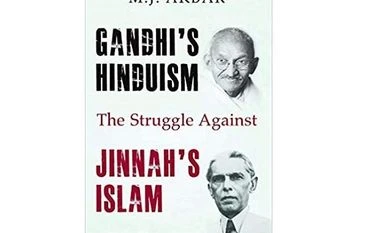Professionally, M J Akbar dominated Indian print journalism for four decades, from his late 20s till a few years ago. As if editing publications with great distinction and writing in a most attractive way were not enough he also wrote 10 books.
One of them was a biography of India’s first prime minister, Jawaharlal Nehru. That was in 1988. Soon thereafter, though not because of the book, he became a Congress MP from Bihar. But that phase of his political career didn’t last long and he soon returned to writing and editing.
Times change. Views change. Some years ago, he joined the Bharatiya Janata Party. He even became a junior minister. He is still an MP.
The Nehru book, many said when it was published, was unduly adulatory. In this book, Mr Akbar finds Nehru to be quite imperfect. That said, this book is not about Nehru but about Gandhiji. Nehru merely appears as someone who didn’t know what he was doing.
But did Gandhiji? Indeed, did anyone in the years between 1939, when the Second World War started, and 1947, when the British slunk off from India, their imperial tail between their now shortened legs?
1945, thus, saw a happy convergence of British and Congress interests, except that the British, who held the upper hand, encouraged Mohammed Ali Jinnah to demand a separate country for India’s Muslims. They saw Pakistan as a captive military base to protect their oil interests in West Asia. So it wasn’t so much Gandhiji’s Hinduism against Jinnah’s Islam as the British for Jinnah, Islam or not.
Perfidious Albion: The British managed to muddy the waters so much that the Congress, now minus Gandhiji for all practical purposes, forgot that it was they, the British, and not Jinnah, who was the real enemy. So it refused to accommodate him. The result, eventually, was partition. Only the British, and later the US, gained from it. Everyone else lost.
Mr Akbar tells this story with his usual diligence about facts and facets and his customary lucidity. But I think he lets the British off all too easily.
There’s another aspect that he neglects. The truth, as the Oxford professor, Judith Brown showed in her classic book Gandhi in 1990, is that after 1939 Gandhiji’s hold over the Congress weakened to a point where, when he called for a satyagraha in 1940, the party more or less ignored him because its leaders had moved on. The British, of course, knew this and acted accordingly.
From their point of view, busy as they were fighting off Hitler, India was a minor distraction, at worst a major law and order problem. The Quit India movement provided them the excuse to lock up everyone except Jinnah, who prospered.
A mass of detail: When the main story has been told a thousand times, as this one has, it’s time to look for details. Mr Akbar does that superbly. His list of references is indicative of due diligence.
Indeed, truth be told, the degree of detail can become a little overwhelming. But you have to hand it to him for putting it all together.
But I have always believed that for every detail there is an equal and opposite detail. If that’s not bad enough, there’s always a tiny but significant detail that surfaces much later.
And then, there’s the verbal impetus to actions: Who did what in response to a hint or a request or an order? Mostly we never get to know. For example, why did Gandhiji write to Churchill in July 1944? Mr Akbar has written about that letter in some detail. He says Gandhiji received no response.
But that’s not surprising. By then Churchill was not just unwell, he was also busy with the successful invasion of Europe and working out the post-war arrangements for it. India and the naked fakir were farthest from his mind.
Mr Akbar also says in 1943 Jinnah, too, was very unwell and, perhaps thinking he might be about to die, went on a massive shopping spree buying all sorts of things and renovating his several houses in Bombay and Delhi. We learn that he had seven flats in London and charged Rs 1,500 a day for his services. We are also told of Churchill asking if Gandhiji consumed glucose during his fasts. He was assured that this was not so.
Then there’s Jinnah the Muslim who didn’t know that August 14, 1947, his Pakistan’s Independence day, fell during Ramzan. As a result, the celebratory lunch had to be postponed till dinner. Mr Akbar leavens his narrative throughout with this yeast. The result is a delicious cake to be nibbled at rather than gobbled. So, bon appetit.
Gandhi’s Hinduism: The Struggle Against Jinnah’s Islam
Author: M J Akbar
Publisher:Bloomsbury
Price: Rs 700
Unlock 30+ premium stories daily hand-picked by our editors, across devices on browser and app.
Pick your 5 favourite companies, get a daily email with all news updates on them.
Full access to our intuitive epaper - clip, save, share articles from any device; newspaper archives from 2006.
Preferential invites to Business Standard events.
Curated newsletters on markets, personal finance, policy & politics, start-ups, technology, and more.
)